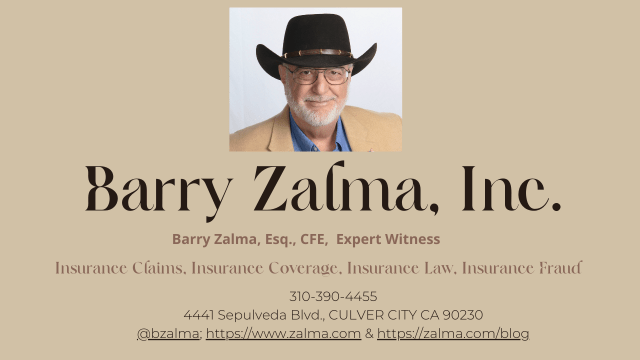Insurance Contract Dispute Is Not Bad Faith
Denial of a Claim Over Whether Water Entering Building is a Flood Alone is not Bad Faith
 In Summit Management Services, Inc, and Riverwalk Denver II, LLC v. Falls Lake Fire & Casualty Company And Colony Insurance Company, Civil Action No. 5:21-CV-00110-KDB-DSC, United States District Court, W.D. North Carolina, Statesville Division (March 11, 2022) the Parties each moved for a judgment on the pleadings which is treated similarly to a motion to dismiss.
In Summit Management Services, Inc, and Riverwalk Denver II, LLC v. Falls Lake Fire & Casualty Company And Colony Insurance Company, Civil Action No. 5:21-CV-00110-KDB-DSC, United States District Court, W.D. North Carolina, Statesville Division (March 11, 2022) the Parties each moved for a judgment on the pleadings which is treated similarly to a motion to dismiss.
MOTIONS TO DISMISS
The court, on a motion to dismiss accepts all well-pled facts as true and draws all reasonable inferences in Plaintiff’s favor. In so doing, the Court must view the facts presented in the pleadings and the inferences to be drawn therefrom in the light most favorable to the nonmoving party. A motion to dismiss determines only whether a claim is stated; it does not resolve contests surrounding the facts, the merits of a claim, or the applicability of defenses.
A court may consider documents incorporated into the complaint by reference and matters of which a court may take judicial notice. In particular, when considering a motion, a court may consider official public records, documents central to plaintiff’s claim, and documents sufficiently referred to in the complaint … so long as the authenticity of these documents is not disputed. The Court, therefore, considered the insurance policy at issue along with the other documents attached to the pleadings.
FACTS
Plaintiffs Summit Management Services, Inc. and Riverwalk Denver II, LLC (“Summit”) own and operate the Riverwalk Apartment Complex located in Denver, North Carolina. Defendants Falls Lake Fire & Casualty Company and Colony Insurance Company (“Falls Lake Insurance”) provided Summit with a property insurance policy that insured the complex from March 31, 2020 until March 31, 2021 (the “Policy”). The dispute in this case concerns whether the Policy covers over $300,000 in alleged damage to eight ground-level apartment units that were damaged due to water entering the building during a minor rain event.
The pleadings reflect that the Parties agree in part and disagree in part on the cause of the water damage. Expert engineering firms hired by each side determined that backup or overflow from sewers or drains caused an overflow of stormwater, which entered the eight units and caused substantial damage. However, the engineering firms disagree on whether the amount and/or rate of rain was a contributing cause of the water damage.
Summit filed a claim under the Policy stating that the damage was caused by “Back Up or Overflow of Sewer or Drains, ” which is a specific risk covered by the Policy. Defendants denied the claim based upon the Policy’s exclusion of coverage for “floods”. “Flood” is defined in the Policy, in relevant part, as “[a] general and temporary condition of partial or complete inundation of normally dry land areas from: (1) The unusual and rapid accumulation or runoff of surface waters from any source … .” and is specifically referenced as an exclusion in the grant of coverage for sewer or drain backups. (“However, no coverage is extended for loss or damage that results from sewer or sump overflow resulting from ‘Flood.’”).
Defendants denied coverage based on the Policy’s exclusion for “loss or damage to: The interior of any “building” or structure caused by or resulting from rain … .” However, as to this exclusion, the Policy does not contain “anti-concurrent cause” language. Therefore, if a covered cause joined with damage “resulting from rain” it might still be covered under the Policy.
DISCUSSION
There are specific rules of interpretation for insurance policies under North Carolina law. Significantly, wherever possible, the policy will be interpreted in a manner which gives, but never takes away coverage. The insured bears the burden to prove coverage. Interpreting the Policy, the Court must take into account that North Carolina is a concurrent causation state. A loss will generally be covered if the damage results from more than one cause of loss, even if one of the causes is specifically excluded under the terms of the policy.
The Flood Exclusion
In the absence of an applicable exclusion from coverage, the Policy provides coverage for covered loss or damage “that results from back up or overflow of sewers or sump pump wells or similar devices.” There appears to be no dispute that at least one of the causes of the damage alleged by the Plaintiff was the backup of stormwater from a blocked storm drain or sewer. Similarly, Plaintiff does not dispute that “if the underlying rain event at issue in this case constituted a ‘[f]lood,’ as that term is defined by the Policy, coverage would be excluded pursuant to the Policy’s anti-concurrent causation clause language in [the section related to sewers or drains].” Therefore, the critical issue in determining whether the Policy’s “Back Up or Overflow of Sewer or Drains, ” coverage applies to Plaintiff’s losses is whether there was a “flood” at the apartment complex.
The Parties have, based on differing expert opinions, presented, at least at this early stage of the case, a disputed factual issue on whether the rain event, in its amount/rate of rain, was “unusual” in accordance with the plain and ordinary meaning of that word. Therefore, neither party is entitled to judgment on the pleadings as a matter of law on the Policy’s flood exclusion.
The Exclusion for Interior Building Damage Resulting from Rain
Similarly, the Court found in favor of the Plaintiff on the Policy provision that states that the policy “does not insure loss or damage to: The interior of any “building” or structure caused by or resulting from rain . . . .” While Plaintiff indisputably seeks to recover for loss or damage to the interior of several apartments caused by or resulting from rain (at least in part), this section of the Policy does not include the same anti-concurrent causation language as the flood exclusion. As discussed above, Plaintiff has sufficiently alleged that its water damages were “caused” by a backup in the drains / sewers, a cause for which the Policy separately and expressly grants coverage. Therefore, even though Plaintiff cannot recover based on damages “caused by or resulting from rain, ” it may potentially be entitled to coverage under the covered concurrent cause of a blocked drain or sewer. The Court, therefore, denied Defendant’s motion on the basis of a lack of coverage for interior building damage caused by or resulting from rain.
Plaintiff’s “Bad Faith” and Unfair Trade Practices Claims
In addition to its breach of contract claim for coverage under the Policy, Plaintiff asserts claims for breach of the “covenant of good faith and fair dealing” and claims for violation of North Carolina statutes related to “unfair claims settlement practices” and unfair and deceptive trade practices. The Magistrate judge recommended granting Defendants’ motion as to these claims, and Plaintiffs did not raise any specific objection to the Magistrate’s recommendation. In the absence of a timely filed objection, a district court must only satisfy itself that there is no clear error on the face of the record in order to accept the recommendation and need not give any further explanation for adopting the recommendations.
The court concluded that the defendant insurer was entitled to judgment on the pleadings on Plaintiff’s “bad faith” and unfair practices claims. The parties here are engaged in a contractual dispute about coverage under a written insurance policy, no more and no less.
ZALMA OPINION
This case establishes that plaintiffs abuse the bad faith tort by claiming bad faith conduct when the parties are simply involved in a dispute over an issue of the coverage provided by a policy and its application to specific policy language. The bad faith tort requires despicable conduct on the part of the insurer not just a dispute over what the policy means.
 (c) 2022 Barry Zalma & ClaimSchool, Inc.
(c) 2022 Barry Zalma & ClaimSchool, Inc.
Barry Zalma, Esq., CFE, now limits his practice to service as an insurance consultant specializing in insurance coverage, insurance claims handling, insurance bad faith and insurance fraud almost equally for insurers and policyholders. He also serves as an arbitrator or mediator for insurance related disputes. He practiced law in California for more than 44 years as an insurance coverage and claims handling lawyer and more than 54 years in the insurance business. He is available at http://www.zalma.com and zalma@zalma.com.
Over the last 54 years Barry Zalma has dedicated his life to insurance, insurance claims and the need to defeat insurance fraud. He has created a library of books and other materials to make it possible for insurers and their claims staff to become insurance claims professionals.
Subscribe to Zalma on Insurance at locals.com https://zalmaoninsurance.local.com/subscribe. Subscribe to Excellence in Claims Handling at https://barryzalma.substack.com/welcome. Write to Mr. Zalma at zalma@zalma.com; http://www.zalma.com; http://zalma.com/blog; I publish daily articles at https://zalma.substack.com, Go to the podcast Zalma On Insurance at https://anchor.fm/barry-zalma; Follow Mr. Zalma on Twitter at https://twitter.com/bzalma; Go to Barry Zalma videos at Rumble.com at https://rumble.com/c/c-262921; Go to Barry Zalma on YouTube- https://www.youtube.com/channel/UCysiZklEtxZsSF9DfC0Expg; Go to the Insurance Claims Library – https://zalma.com/blog/insurance-claims-library/ Read posts from Barry Zalma at Go to the Insurance Claims Library – https://zalma.com/blog/insurance-claims-library/







